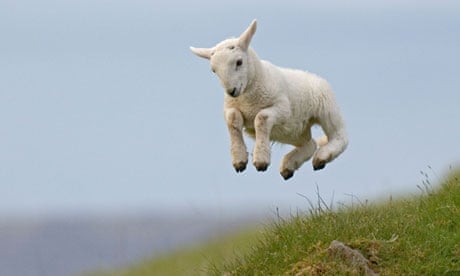This week's publication of the world's first structured benchmark of farm animal welfare suggests that many of the world's major food companies have yet to recognise the business importance of farm animal welfare. Under the auspices of the Business Benchmark on Farm Animal Welfare, a programme supported by the leading farm animal welfare organisations Compassion in World Farming and the World Society for the Protection of Animals, we assessed the farm animal welfare performance of 68 global food companies including retailers and wholesalers, restaurants and bars, and producers and manufacturers.
The benchmark revealed that farm animal welfare is receiving much less attention than other issues on the food industry's corporate responsibility agenda. For example, while over 70% of the companies covered by the assessment acknowledged farm animal welfare as a business issue, only 46% had published a formal farm animal welfare policy, and only 41% described how their board or senior management oversee their approach to farm animal welfare. Perhaps the most striking finding was that 23 out of the 68 companies, a group which included Wal-Mart, Mars and Burger King, had not even acknowledged farm animal welfare as an issue for their business or their stakeholders.
The benchmark also examined how companies are managing farm animal welfare-related issues in their supply chains. While many of the companies surveyed provided quite a lot of information on how they ensured the safety, quality and regulatory compliance of their products, it was not clear that farm animal welfare was a substantial part of their approach to supply chain management. Just ten of the companies stated that they included farm animal welfare in contractual conditions and one third described their supply chain auditing processes.
While we are wary of extending our conclusions beyond farm animal welfare, these findings about how companies are managing and monitoring their supply chains when seen in the context of the horsemeat scandal are a clear reminder of the old adage that "what gets measured gets managed". While acknowledging the potential for things to go wrong, the companies that we interviewed in the course of our research were reasonably confident that their systems and processes would deliver the results that they were intended to deliver. That is, they were confident that their products would meet the quality, safety and regulatory requirements that were expected. However, they acknowledged that this did not mean that these products would meet requirements beyond those that were expected or that were not built into contracts or auditing processes.
Our research has been published against a backdrop of strong customer interest in farm animal welfare, with growing evidence that consumer interest in animal welfare is starting to translate into real changes in the products that they purchase. Even in the recession, surveys have consistently demonstrated that upwards of 70% of consumers in the UK, the US and Australia are concerned about farm animal welfare. In fact, animal welfare is consistently rated above health and safety concerns as the single most important sustainability related food issue for British consumers.
Forward-thinking businesses are beginning to respond. Sainsbury's, for example, ensures it uses only cage-free eggs across its entire supply chain, while Unilever and Premier Foods are rolling out ethical animal policies across their brands. What the benchmark shows is that it is not enough to offer higher welfare products in narrow customer segments. It is clear that companies need to take a much more structured, programmatic approach where – as companies such as Noble Foods, The Co-operative Food, Marks and Spencer and McDonald's do – they build farm animal welfare into their policies, their management systems and processes, their responsibilities and their reporting.
There are signs that companies are taking this message on board. A number of the companies covered by the benchmark have already improved their reporting on farm animal welfare, and others have indicated that the benchmark has catalysed them to look more closely at their management and performance on farm animal welfare.
The Business Benchmark on Farm Animal Welfare will provide a framework for companies thinking about how to manage farm animal welfare and it provides an accountability mechanism to stakeholders for performance. Over time, the Benchmark should help delineate between companies managing farm animal welfare for competitive advantage, those companies that regard farm animal welfare as a business risk to be managed, and those companies that choose not to acknowledge farm animal welfare as a business issue.
Nicky Amos is the programme director and Rory Sullivan is expert adviser to the Business Benchmark on Farm Animal Welfare. Nicky Amos and Rory Sullivan (2013), Business Benchmark on Farm Animal Welfare: 2012 Report (BBFAW, London). For further information, see www.bbfaw.com
This content is brought to you by Guardian Professional. Become a GSB member to get more stories like this direct to your inbox

Comments (…)
Sign in or create your Guardian account to join the discussion